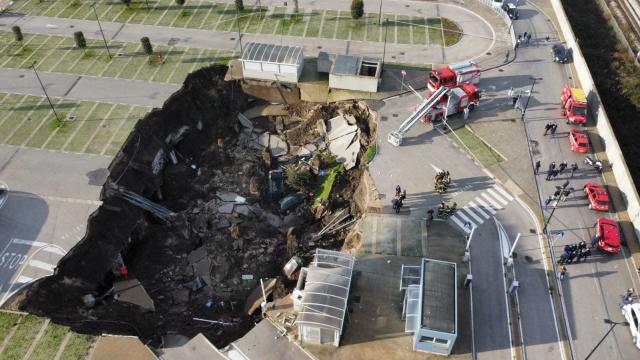In case you need more proof that we live in hell, a massive sinkhole opened in an Italian hospital’s parking lot on Friday. The gaping hole, which was 20 metres deep and 2,000 square metres wide, swallowed at least three cars in the Naples car park. It also disrupted the hospital’s electricity and water lines, forcing medical workers to close a residence for people recovering from covid-19 and relocate six patients. As of Sunday, the hospital is still running on backup power sources.
Sinkholes form when there is no way for water to drain from the ground, and circulating groundwater thereby dissolves rock and soil. The surface of the ground can then collapse into the hollow cavities. In a statement to Italian TV channel SkyTG 24, Naples chief firefighter Ennio Aquilino said the hole almost certainly opened up because of recent heavy rains in the region. The province had seen extremely rainfall in the days before the hole appeared, and two weeks ago, a torrential downpour coupled with strong winds and punishing waves damaged the city’s waterfront. Climate change is increasing the odds of heavy downpours by warming the atmosphere, priming them to hold more water that can come down in deluges.
Incredibly, according to the Naples Police, no one was injured by the sinkhole, and thanks to backup systems, most operations at the Naples Ospedale Del Mare, or Hospital of the Sea were able to continue. Still, the wild occurrence is a scary reminder that the climate crisis is a threat multiplier.
When the covid-19 pandemic first broke out early last year, southern Italy was one of the hardest-hit parts of the world. With the nation’s healthcare system overwhelmed, Hospital of the Sea workers responded by creating the Napoli 1 COVID Centre, setting up trailers in their parking lot to house sick patients. But it seems that system wasn’t able to withstand the pressure of extreme rain and resulting sinkhole.
The incident shows how urgently we need to ensure our cities’ infrastructure can handle the effects of global warming, including sinkhole formation. Multiple lines of research suggest that as climate change ramps up precipitation, more of these collapses will take place. That will put people and property at immediate risk, and raise the odds that water supplies could face contamination.
In addition to preparing infrastructure to handle more precipitation, governments should regularly check on water infrastructure and preemptively repair corroded pipes to ensure they don’t leak water into the ground. That’s especially true in karst terrain, or topography made up of porous rocks like limestone and carbonate rock that undergirds a large swath of Florida, which are more susceptible to sinkhole formation. Some researchers are also developing additives to inject into the ground in vulnerable areas to shore it up from sinking. Of course, these adaptation plans must be coupled with efforts to curb the climate crisis by drawing down our carbon emissions as fast as possible, limiting the heavy rainfall we’ll see in the future. The last thing we need right now — or in the future — are more sinkholes swallowing such crucial infrastructure.
